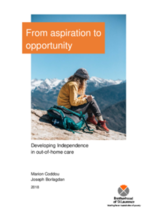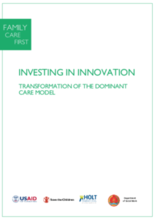Displaying 661 - 670 of 991
This study sought to build on previous work that calls for the need to develop programs to support foster care alumni in higher education and to obtain a better understanding of the characteristics of existing programs and the perceived programmatic and student challenges as reported by program directors and staff, faculty, and researchers.
A First Nations child welfare organization has prioritized further understanding of reunification and parenting, including identification of successes and barriers to reunification, and service needs within communities. These priorities were addressed with a community-based participatory research model and guided by a Research Advisory.
Among older youth transitioning from the foster care system, this longitudinal study examined the association of religious and spiritual capital to substance use in the past year at age 19.
This Training Manual seeks to raise awareness of the content of the Prepare for Leaving Care: Practice Guidance, build knowledge and skills to support young people through the process of leaving care and help trainees to understand and develop some of the tools which are helpful in the leaving care process.
This video highlights the work of JJ's Children's Home (funded by a US-based organization called Heaven's Family) in their journey to transition from institutional care of children to family-based care, with the support of SFAC and ACCIR's Kinnected program, reintegrating children into their families or placing them in kinship and foster care.
This paper discusses the results of a qualitative study on adult care leavers in Flanders (Belgium).
The report presents an evaluation of the second stage of the the Developing Independence (DI) in Out-of-home care (OOHC) pilot in Melbourne, Australia.
This study focuses on the preparation for social reintegration of young Indian girls about to leave their residential care homes.
This report marks a critical step in compiling comparable data and information about children in out-of-home care in Asia, defining our understanding of the continuum of care options available and metaphors to identify the gaps, challenges, strengths and opportunities within the child care systems in 10 identified Asian countries.
This study and documentation of existing reintegration and alternative family care services in Cambodia was designed to build the capacity of existing service providers to take emerging good practice to scale as an increased number of residential care institutions transition.




